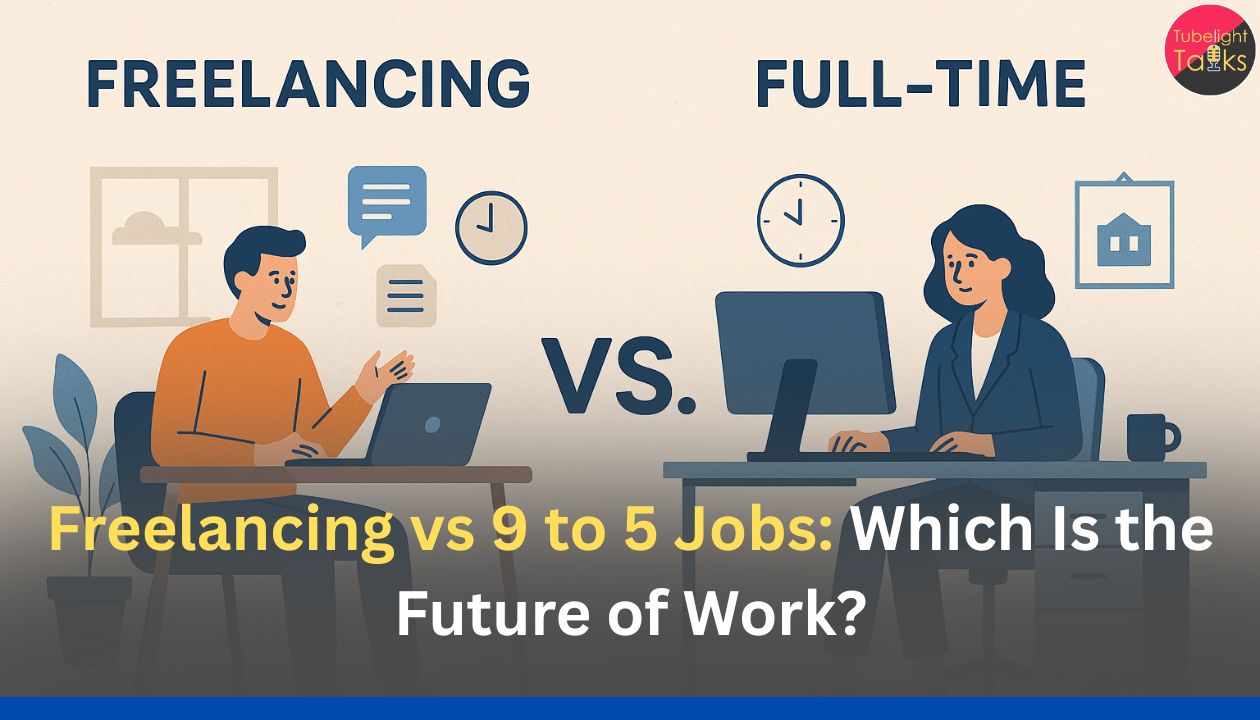Freelancing vs 9 to 5 Jobs: Which Is the Future of Work?
Freelancing vs 9 to 5 Jobs: In today’s rapidly evolving world, the concept of work has undergone a massive transformation. Gone are the days when success was measured by stability and a fixed paycheck. Now, flexibility, creativity, and freedom are redefining how people view their careers. As technology continues to revolutionize workplaces and remote collaboration becomes the norm, one key question arises: Is the future of work freelance or traditional 9–5 jobs?
Let’s dive deep into this modern work debate and understand which path is shaping the future.
The Evolution of Work
Over the last decade, digitalization and the internet have reshaped nearly every industry. Cloud technology, project management tools, and global communication platforms have made it easier than ever to work from anywhere.
This transformation gave rise to a new class of professionals—freelancers—who prefer independence over routine.
According to a 2024 report by Upwork, over 50% of the global workforce will be freelancers by 2030. This shift indicates a growing preference for flexible, skill-based work rather than long-term corporate roles. However, traditional employment still holds strong appeal for millions seeking security, structure, and benefits.
Understanding 9–5 Jobs
A 9–5 job refers to traditional full-time employment where an individual works fixed hours for a single employer, usually in an office or hybrid setup. These roles come with stability, predictable income, and structured growth opportunities.
Advantages of 9–5 Jobs
- Job Security – Regular income and long-term employment contracts provide financial stability.
- Employee Benefits – Health insurance, paid leaves, and retirement plans add extra value.
- Structured Growth – Promotions, performance appraisals, and skill development pathways.
- Team Collaboration – Regular interaction with colleagues boosts teamwork and communication.
- Clear Role Definition – Each employee has a specific set of tasks and responsibilities.
Disadvantages of 9–5 Jobs
- Limited Flexibility – Fixed schedules can restrict personal freedom and creativity.
- Commute Stress – Long travel hours can drain energy and productivity.
- Work-Life Imbalance – Many employees find it hard to separate work from personal life.
- Slow Career Growth – Promotions may depend more on tenure than performance.
- Less Autonomy – Decision-making power often lies with management, not employees.
The Rise of Freelancing
Freelancing means working independently for multiple clients without being tied to a single employer. Freelancers are self-employed professionals who provide services such as writing, graphic design, web development, marketing, and consulting.
The internet has made freelancing a global phenomenon. Platforms like Upwork, Fiverr, and Freelancer connect millions of skilled professionals to clients worldwide. Even large organizations are turning to freelancers for project-based work to reduce operational costs and access global talent.
Advantages of Freelancing
- Flexibility & Freedom – Work from anywhere, anytime. You choose your clients and projects.
- Higher Earning Potential – Skilled freelancers often earn more per hour than full-time employees.
- Diverse Opportunities – Exposure to multiple industries and projects enhances learning.
- Personal Branding – Freelancers can build their identity and reputation based on skills.
- Work-Life Balance – You control your workload and schedule.
Disadvantages of Freelancing
- Income Instability – No guaranteed monthly salary; earnings may fluctuate.
- No Employee Benefits – Health insurance, pension, or paid leaves are self-managed.
- Client Dependence – Inconsistent clients or delayed payments can cause stress.
- Isolation – Working alone may lead to loneliness or reduced social interaction.
- Self-Discipline Required – You must manage time, taxes, and productivity independently.
Freelancing vs. 9–5 Jobs: A Quick Comparison
| Factor | Freelancing | 9–5 Jobs |
| Flexibility | High – You set your schedule | Low – Fixed office hours |
| Income Stability | Variable, project-based | Stable monthly salary |
| Workplace | Anywhere (remote) | Usually office or hybrid |
| Career Growth | Skill-based and fast | Structured but slower |
| Benefits | Self-funded | Employer-provided |
| Autonomy | Full control | Limited control |
| Networking | Broad and global | Mostly within company |
| Work-Life Balance | Self-managed | Often difficult to maintain |
The Future of Work: A Hybrid Revolution
The debate between freelancing and 9–5 jobs doesn’t have a single winner. The future of work is moving toward a hybrid model that combines the best of both worlds.
Companies are increasingly adopting “gig economy” models—hiring independent professionals for specialized tasks while maintaining a core full-time team.
This approach gives organizations agility and allows professionals to enjoy flexibility with stability. Even many corporate employees now freelance part-time to earn extra income or explore passion projects.
The Skills That Define the Future Workforce
Regardless of which path you choose, the future of work demands continuous learning and digital adaptability. Here are essential skills that both freelancers and employees need:
- Digital Literacy – Understanding online tools, AI, and automation.
- Communication Skills – Effective remote collaboration.
- Self-Management – Time, productivity, and discipline.
- Networking & Personal Branding – Building your professional reputation online.
- Emotional Intelligence – Balancing independence with teamwork.
So, Which One Is Right for You?
Choosing between freelancing and a 9–5 job depends on your goals, lifestyle, and personality.
- If you value stability, teamwork, and career structure, a 9–5 job suits you best.
- If you crave freedom, creativity, and flexible work hours, freelancing might be your future.
The ideal solution for many is blending both—start with a 9–5 job for experience, build skills, then transition into freelancing once you’re confident in managing clients and income.
Spiritual Perspective: True Freedom Lies Beyond Work
In the modern race between freelancing and corporate life, we often forget the ultimate purpose of human existence — peace, service, and connection with the Supreme Power. Whether you work from home or from an office, true satisfaction doesn’t come from deadlines or paychecks, but from spiritual balance.
Saint Rampal Ji Maharaj teaches that material success is temporary, but eternal peace lies in devotion to the Supreme God Kabir. The real “future of work” should therefore not only focus on earning but also on serving humanity and attaining true happiness.
Through initiatives like the Annapurna Muhim, followers of Saint Rampal Ji Maharaj are bringing this vision to life.
The mission’s logo — “Roti, Kapda, Siksha, Chikitsha aur Makan har gareeb ko dega Kabir Bhagwan” — embodies the divine promise that no one will remain deprived of basic needs when society works with compassion and righteousness.
So as we debate freelancing vs. 9–5 jobs, let’s remember that the highest form of work is seva (selfless service) — uplifting others and walking on the path of true devotion. That is the real future of a meaningful life.
Also Read: The Gig Economy in 2025: How Indians Are Thriving Outside
FAQs: Freelancing vs 9 to 5 Jobs
Q1. Is freelancing more profitable than a 9–5 job?
It depends on your skills and consistency. Skilled freelancers can earn more per project, but income stability varies.
Q2. Can I do freelancing while having a full-time job?
Yes, as long as your company allows it and you can balance your time effectively.
Q3. Which career path offers better work-life balance?
Freelancing offers flexibility, but maintaining discipline is crucial. 9–5 jobs can provide balance if the company supports flexible work culture.
Q4. What are the top freelancing fields in 2025?
Web development, digital marketing, content writing, UI/UX design, and AI-based services are among the fastest-growing.
Q5. Is freelancing secure in the long run?
Yes, if you build a strong client base, diversify income streams, and continue upgrading your skills.











Discussion (0)